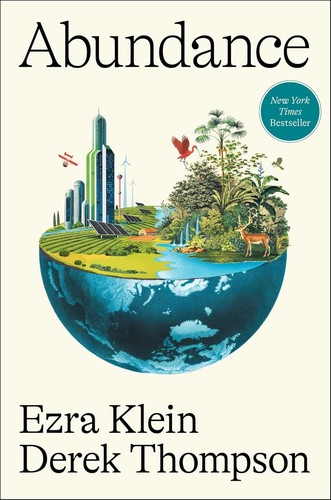Abundance

Abundance is a manifesto for supply side liberalism from two of the most influential journalists on the center-left: Ezra Klein of the NYTimes and Derek Thompson of TheAtlantic/The Ringer. Both run popular podcasts: the Ezra Klein Show and Plain English by Ezra Klein (obviously) and Derek Thompson respectively. Both have been highly influential in Democratic Party politics, especially Ezra. Notably, he was one of the first to call for Biden to drop out of the presidential race back in February 2024, 4 months before the debacle of the Biden-Trump debate in June.
Abundance is their attempt to shape the Democratic Party agenda towards a vision of, well, abundance. They open their book with a portrait of life in 2050. Drones deliver packages to your doorstep. Your EV charges in the garage with clean electricity. New drugs have extended lifespans and healthspans so that living to 100 becomes routine. To make their vision possible, they have a list of policy proposals for housing, infrastructure, energy, biotechnology, and government bureaucracy. The book is precise in its detail of implementation. A lesson both have drawn from tshe Biden administration is that it is not enough to pass massive spending legislation in Congress if projects are slowed by reviews and lawsuits. For too long, progressives have had the same solution for every problem: throwing money. Abundance is a welcome break from that mentality.
The book struck me as incredibly neoliberal, an orthodoxy no party believes in anymore. It calls for deregulation of housing markets, removing unnecessary requirements from government programs, reducing the paperwork required for scientists to get grants, and generally recommending that government gets out of the way of great man inventors and entrepreneurs who power the American economy. Klein and Thompson sidestep questions of distribution and focus exclusively on growth.
Yet, the authors not only call on Washington to reform the civil service to have the agility of a private company but also to expand its ranks. Klein and Thompson note that the federal workforce size has been fixed since the 1970s, relying increasingly on contractors to fulfill important duties. Developing in-house expertise is essential for state capacity, they argue.
What strikes me about both political parties at this moment is their utter inability to imagine the future without turning to the past. The Republicans are dominated by a reactionary right that wants to pull America back to the 1950s. The Democrats contain a leftist coalition which draws inspiration from the 1930s New Deal but also the extensive social welfare systems of Scandinavia. Abundance doesn’t wholly break this paralysis of imagination; it takes a lot of inspiration from the 1960s (it’s vision of the future is very Jetsons), even ending with a speech from Lyndon B. Johnson the 1964-65 World’s Fair. But it is a novel extrapolation of some of the best trends in progressivism—YIMBYs, grey environmentalism, a renewed interest in industrial policy—and synthesizes them into a coherent and optimistic politics.